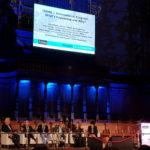Yesterday, we hosted the kick-off meeting for the Open Environmental Risk Standard start up team. This is our summary of that conversation.
Over 50% of what should be insured in the world, isn’t
Our way of assessing, managing and mitigating environmental risk is not fit for purpose.
For many reasons, our exposure and vulnerability to events such as extreme weather, earthquakes, flooding, landslides, extreme heat and drought is increasing.
When companies (e.g. insurers) and planners (urban planners, local and national governments) model these risks, they do so in a ‘black box’. Everyone assumes each model is ‘the best and most accurate’ — the opposite is true.
We are heading towards
a market failure — in the near future
Market failure means places and things become uninsurable or more expensive to insure.
On the ground, regions, companies and people are not risk informed.
These are difficult and complicated challenges. They are also collective-action problems. Climate KIC is investing in this project to help bring us together. To address them we need to bring together very diverse skills (from risk modelling to policy to data).
We believe that it is essential that we do something, that there is a coincidence of desires to create a collective response now, and that there are huge opportunities to create new solutions.
The OERS project will, in the coming weeks:
- Create and articulate a clear vision as to specific outcomes
- Convene people across disciplines that can invent new solutions
- Focus on needs, use-cases, business models and scenarios that help communicate the potential
- Map out what elements we should include, and what we should not
In our meeting, we discussed from which angles we could tackle this problem to demonstrate a market failure and market opportunity.
We agreed that:
- long-term infrastructure funding would be a good target as it ties into resilience
- that the risk insurance sector was a useful target as it has vested interests, substantial exposure, and substantial capital
We will clearly articulate the vision and mission with the next two weeks, and create a proposal for UNISDR in May. We are working out what our viable boundary conditions for making something.
We are actively inviting those with vested interests, those impacted and decision-makers to join us at the table.
If you are interested in participating email gea@dgen.net and sign up to our dedication project list. Click here a more detailed briefing.
⇨ Sign up here now (open to all)
Definitions — what do we mean by Open Environmental Risk Standard?
Open:
Open Data = data that is openly licensed for use by anyone for any purpose for free.
Open API = addressable and accessible data that can have other licensing rules placed around it (e.g. commercial license for proprietary information; with legal conditions).
In open banking, your personal bank statements are not Open Data, but they are accessible via an Open API.
For example, in Banking, the Open Banking Standard is open (Creative Commons license) and the banks are co-funding a Trust to develop Open Source (MIT license) software.
Environment is as large as we want it to be (planetary)
Risk key for narrowing our focus rather than ‘boiling the ocean’
Standard is with a small ‘s’ – a standard of behaviour, cultural norms and perceptions





